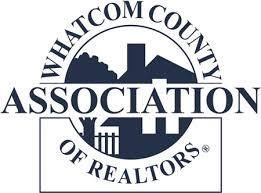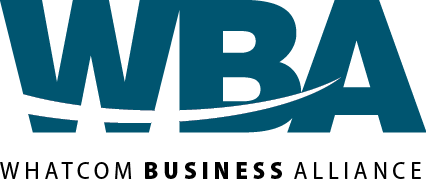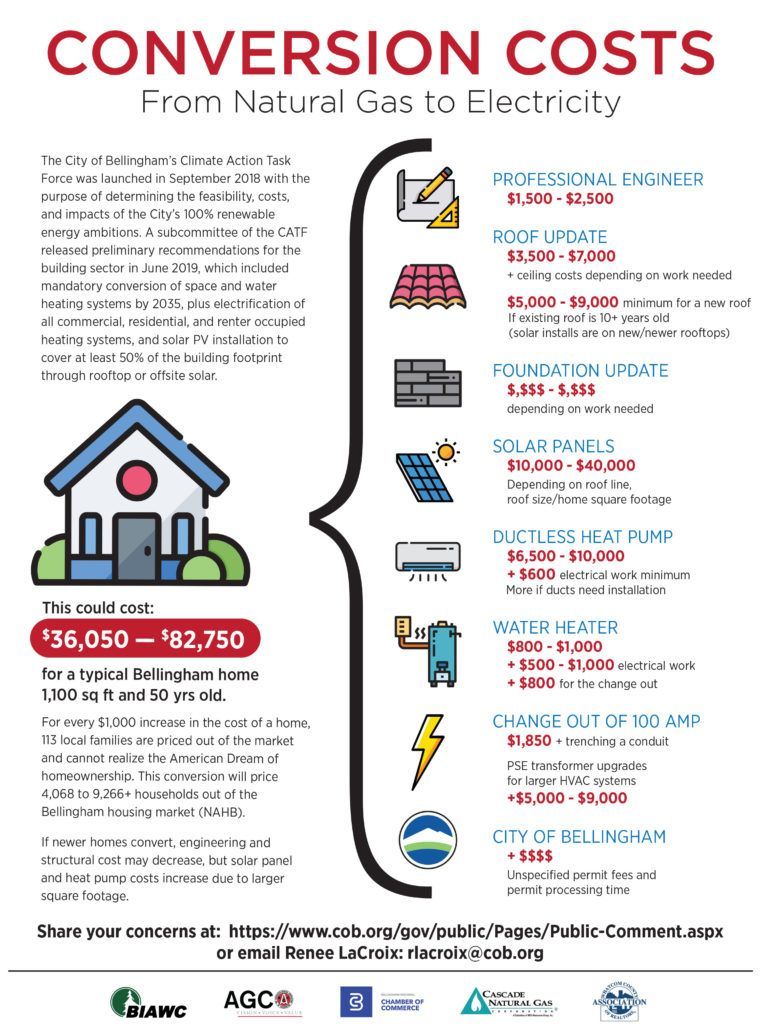Response to Bellingham’s Climate Action Task Force
The City of Bellingham’s Climate Action Task Force was launched in September of 2018 with the purpose of determining the feasibility, costs and impacts of the city’s 100-percent renewable energy ambitions.
The Task Force rolled out preliminary recommendations for the building and transportation sectors in June 2019. Recommendations include the electrification of all commercial, residential, and renter-occupied space and water heating systems by 2035, and the installation of solar PV to cover at least 50 percent of the building footprint through rooftop or offsite solar.
These recommendations, if implemented, would have significant impacts on energy costs, home sales and the city’s economic health.
The BIAWC, the Whatcom County Association of Realtors and Cascade Natural Gas are encouraging the public to lend their voice to this discussion by attending meetings and sharing online public comment.
Whatcom Business Alliance board members support the efforts of these organizations as they work to raise public awareness of the Task Force’s recommendations.
If you live or do business in Bellingham, please engage in this process by reading the BIAWC’s letter to Mayor Linville regarding the Climate Action Task Force (posted below, with permission) and Mayor Linville’s response to that letter (linked at the end).
August 15, 2019
Dear Mayor Linville:
As members of the Bellingham community, we are writing to express our concern regarding the lack of inclusive public engagement in the development of the City’s Climate Action Plan Task Force recommendations.
The City of Bellingham’s Climate Action Task Force was launched in September of 2018 with the purpose of determining the feasibility, costs, and impacts of the City’s 100% renewable energy ambitions.
The Task Force rolled out its preliminary recommendations for the Buildings and Transportation sectors in June 2019. Recommendations include the electrification of all commercial, residential, and renter occupied space and water heating systems by 2035, and the installation of solar PV to cover at least 50% of the building footprint through rooftop or offsite solar. A secondary reduction pathway was proposed that would mandate GHG reductions of 35% by 2025, 65% by 2030, and 100% by 2035.
If this plan moves forward, Bellingham homes and buildings will need to replace their space and water heating equipment with electric heat pump technology, and install solar panels equivalent to at least 50% of their building footprint; or buy offsets within 12 months of purchase whenever a building is sold, or potentially even renovated. Gas cooking and fireplaces would still be allowed for the time being, if offset by the production or procurement of renewable energy.
These recommendations, if implemented, will have significant impacts on energy costs, homes sales, and the City’s economic health. The Climate Action Task Force has only recently requested energy usage data from the local utilities; well after preliminary recommendations were made by the Task Force on the elimination of natural gas space and water heating equipment. Energy reduction targets were also set prior to the development of a viable baseline for carbon reduction. This means that the true impacts of the Task Force’s preliminary recommendations remain unknown.
The Climate Action Task Force’s website states that their plan considers the “triple bottom line plus technology” philosophy. However, current recommendations were developed as part of a tightly controlled process that has excluded participation from much of the Bellingham community. Instead of people, profits, and planet, the Task Force has placed the needs of regular Bellingham citizens, business owners, and low income families on the back burner.
As organizations that employ and serve the City of Bellingham and its economy, we want the people who work, live, rent, and operate small businesses in our community to have the opportunity to share their knowledge, and participate in this process. We encourage the Task Force to engage with the broader community to develop recommendations that truly address climate change without displacing its most vulnerable citizens through severe prohibitions, and unproven policies.
The fundamental strength of the democratic process is the proving of new ideas through thoughtful debate and open discussion. It is essential that whatever is decided, it’s grounded in real economics, and real energy usage information so that true GHG reductions are achieved, and unintended consequences are avoided. It’s essential that decisions impacting the Bellingham community be made with the input of those who will be most impacted by these top-down mandates. Now is the time to bring the innovators from Bellingham’s full business and energy community together to the table to develop a plan that truly serves the triple bottom line. We encourage the Climate Action Plan Task Force to look to us as partners in this effort.
Whether for or against the Task Force’s plan, we also encourage the public to follow the process on the City of Bellingham’s Climate Action Task Force website, and lend their voice to the discussion through meeting attendance and online public comment.
There is still time for the Task Force to tap into our collective expertise and develop sound solutions that truly serve our city.
Thank you for your consideration.

Jacquelyn Styrna
Government Affairs Director
Building Industry Association of Whatcom County
Ph: 360-671-4247 | Desk: 360-255-5041

Alyn Spector
Manager, Energy Efficiency Policy
Cascade Natural Gas Corporation (CNGC)
206-310-1120 / 503-896-3260

R. Perry Eskridge
Exec. Officer/Gov’t Affairs Dir.
Whatcom County Association of REALTORS®
3317 Northwest Ave.
Bellingham, WA 98225
360-671-5477
perrye@wcar.net
Please see the response from Mayor Linville here .
The post Response to Bellingham’s Climate Action Task Force appeared first on Whatcom Business Alliance.

